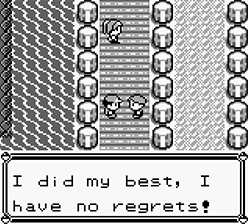As we live and get older, we learn a lot of things about life. Good and bad experiences serve us lessons and make us more equipped when dealing with our unpredictable future. We can also tap other people’s experiences to open us to new ideas. These thoughts were highlighted one day when my wife said that she appreciated my calm demeanor even though things are not going well. While I am not always like this, when I think about it, I attribute this behavior to one principle: living life on the path of least regret.

In electronic theory, we have something called the path of least resistance. Generally, most of the electric current will flow in the path where the resistance is lowest. In the outside world, people will tend to choose things that are easiest for them to do. When choosing a trail to a destination, many choose the path that looks easier and quicker to traverse.
What then is the path of least regret? When deciding between things to do, I find it useful to choose the one that will cause the least amount of regret instead of always choosing the easiest option.
Doing your best in a situation
When I was young I liked to play a game in Gameboy called Pokémon. You play a character who captures and collects monsters and uses them to fight other characters’ monsters. When you battle and defeat some of the non-playable characters, they will say “I did my best, I have no regrets!” in the end. That particular sentence stuck with me until now.

Why did they not have any regrets even though they lost the battle? They were able to accept defeat gracefully because they did everything they can during the fight. They did not run away nor surrender.
When something difficult comes in life, what do you usually do? For me, I often wish that it is not happening, not at this particular moment in my life. Then I realize that there is nothing I can do to change my situation. The only thing I can do is to accept it.
After I have accepted the situation, it is time for action. Asking questions to yourself can help determine what are the actions that you need to take.
- Is there anything I can do to resolve the situation?
- If I can’t resolve it, can I make it less “bad”?
- Do I need to ask anyone for help?
Strive to execute on the answers to these questions. You still do not completely control the outcome nor make your problems go away. The key point is that you do not just surrender to the situation, but you do everything you can even though it may not resolve the problem completely.
One example is when someone you love gets sick, but you are unable to be physically present with them. What can you do given your situation? You can send your love through other means like calling them or messaging them every day. By providing financial support and coordinating help with people close to them, you make sure that their needs are taken care of.
As much as you want to be there in person to take care of them, you cannot, and so there is a limit to the things you can do for them. Knowing this, rest in the fact that you have already done everything you can realistically do. Regardless of the outcome, you have done your best, and you should have no regrets.
What could happen if you did not do everything that you can? Often that is the time when we feel some regret in the future. Going back to the example above, if things take a turn for the worse, then your grief will be amplified if you knew that you did not do everything you can. “I should have asked for help“, “I should have called more often” are some of the thoughts that could be in your mind.
Detach from the outcome
After doing everything you can about the situation, the next important step is to detach yourself from the outcome. This is easier said than done!
What does being detached mean? It does not mean that you do not care at all about the results. The reason why you did your best in the first place is because you care about the situation. Being detached means that you do not go “all in” on your emotions for a particular outcome. Does your entire world get destroyed if the outcome was not what you desired? If yes, then you have not detached yourself enough.
It is normal (and healthy) to feel sadness, grief, or even fear when situations develop into something that we do not expect. However, lingering on those emotions for an extended period of time does not do you good. It elevates your stress levels, clouds your judgment, and it can potentially lead you into doing something more harmful than the present problem.
Doing your best in a situation helps you detach from it. By reducing the amount of regret you may feel when the outcome is not what you expect, it then helps you to accept the outcome for what it is.
The universe works in mysterious ways. It handed me this article.
“The path of least regret”
as opposed to
“The path of least resistance”